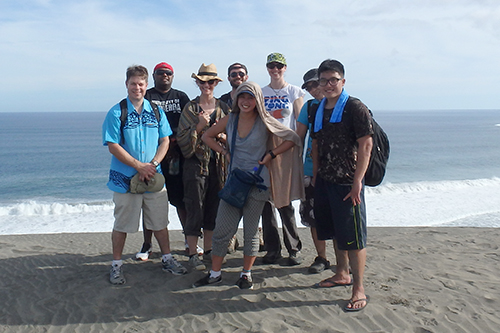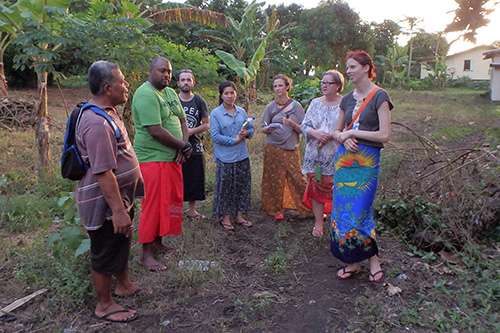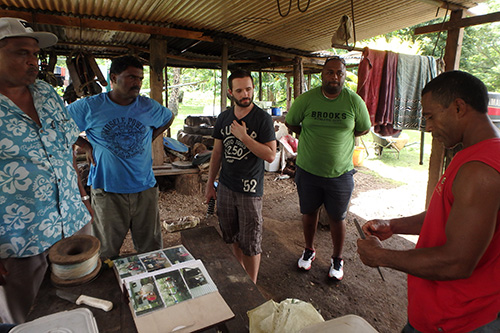UC students have a fruitful Fiji fieldtrip
Vanessa Lam
15 August 2014: A potential interactive Eco-Library to collect information on Fiji's unique flora and fauna, as well as its culture, could be a step closer to reality after a visit by University of Canberra landscape and architecture design students.

|
Assistant Professor Scott Heyes and the students explore the sand dunes at Sigatoka National Park. Photo supplied. |
The students, who visited different parts of Fiji in May, as part of a faculty-led study tour for their Indigenous Conceptions of Landscape unit, got together with the community on the island of Taveuni to discuss this concept.
The group of students was led on a 10-day tour by University of Canberra Assistant Professor in Cultural Heritage Scott Heyes, along with native Fijian Setoki Tuiteci, a Master of Environmental Design student at the University, who provided insights on the country's land, geography, language, and political context.

|
Students learning about Indigenous Fijian culture in Taveuni from local headman Navitalai Qali. Photo supplied. |
During their visit they talked with the local community about the formation of an Eco-Library at the South Taveuni Primary School. The library is envisioned as an interactive and interpretive keeping place of the island's culture and traditions, including information on Taveuni's unique flora and fauna.
The community has high hopes for the project. Dr Heyes said: "There are wonderful opportunities for the Eco-Library to be a celebration of Fiji's diverse cultures and for it to serve the school and be a major tourist attraction. It will be a vibrant gathering place. To our knowledge, the Eco-Library will be the first of its kind in Fiji, if not the Pacific region".

|
Students learning about Fijian culture at local farms. Photo supplied. |
During the trip, the group also met with members of the Econesian society, which is a group from all over the Pacific who are passionate about being part of the global effort to conserve and manage the environment.
The University's staff and students also met with students and professors from the University of South Pacific in Suva to discuss how to better appreciate Fijian ways of knowing and seeing the landscape.
They were also able to visit a side of Fiji that many tourists don't get to see, such as sacred ceremonial places, natural formations that have influenced stories of the locals, and the slums and settlements in Suva.
Urban and regional planning student, Adam Murray, said that "many dwellings had been constructed with just about any material that could be found. They live without infrastructure and often siphon electricity, however, they still go off to work every morning like everyone else."
He said his favourite part of the trip was being able to experience the non-tourist side of Fiji.
"What we experienced was a rich and dynamic blend of cultures with many fascinating places to see. We were able to dive right in and learn about the long political and cultural divisions that exist, giving us a greater understanding of the nation's history," Mr Murray said.
Other activities during the trip included visiting museums, archaeological sites, libraries and housing developments to get a better understanding of the Fijian culture and history.
Part-time arts student Rhonda Nichols said that they were all welcomed and nurtured by the Fijian people.
"The Fijian people were the very best part of the trip. They are kind, caring, happy and accepting. Everywhere we went we were welcome with open arms and were treated as special".
Third year psychology student, Rebecca Tran, said she felt honoured to be able to experience the rare Indigenous landscapes in person, as "it was majestically beautiful and wild".
"An image that has stuck with me was the view driving towards the southern side of the island. There was a rainbow arched over where the land met the sea, and the rainbow seemed to end on the water's horizon," she said.
"The lush rain forests glowed with green and the constant rain seemed to keep the air feeling fresh; the tapping sounds of the rain on the rooftops where almost melodic as well as the soothing sounds of some of the local musicians who played guitar and sung for us one rainy night".
Ms Tran said she would definitely recommend trips such as this to other students because it adds a new dimension to the university learning experience.
"Not only are you able to share experiences and knowledge with unique people from all around the world, but also I found it helped in terms of personal development, a space to self-reflect that is outside one's comfort zone," she said.
Ms Nichols added: "There is so much to learn from other cultures. There is also so much to learn about yourself when you travel."
To learn more about their trip, check out Mr Murray's video about the South Taveuni Eco-Library.


